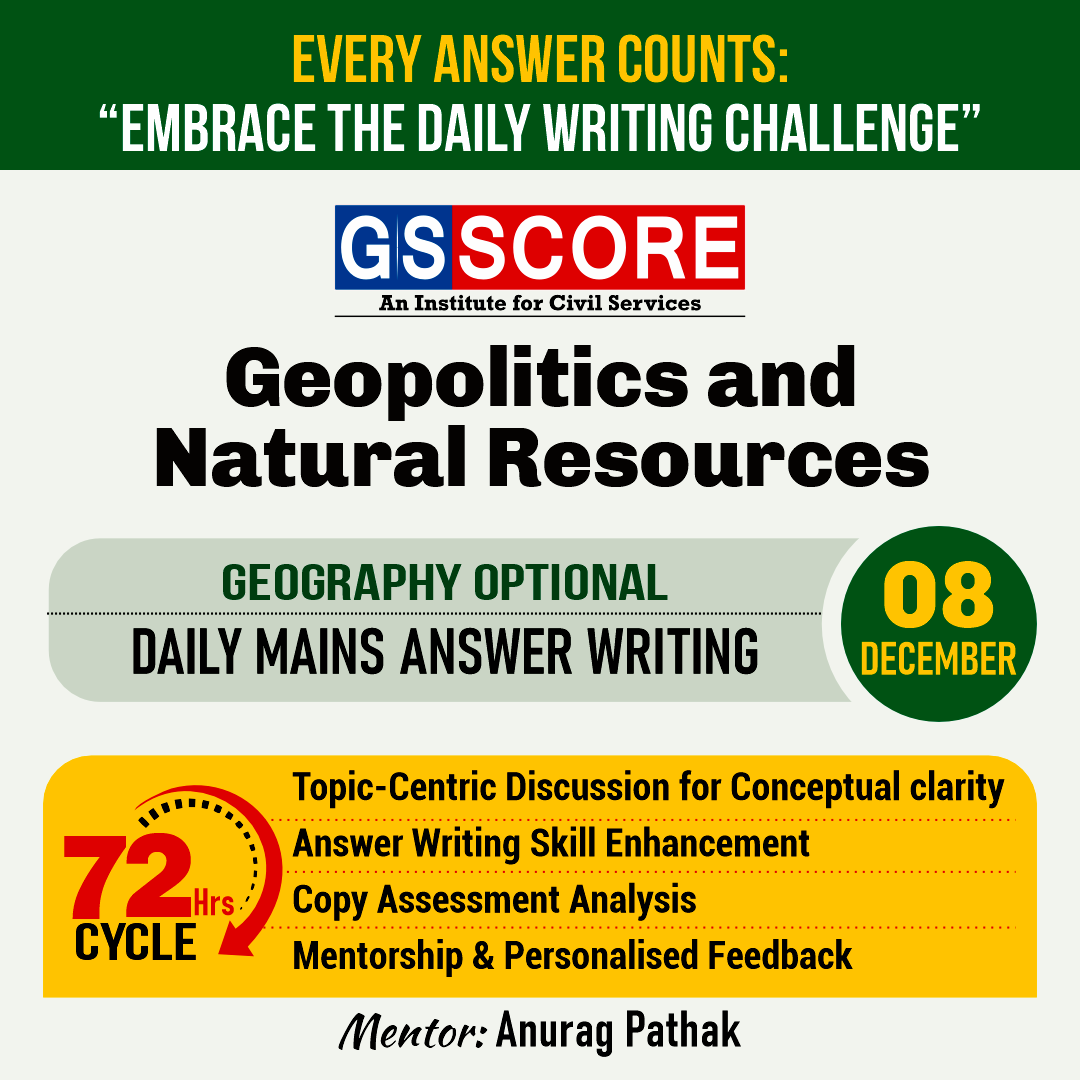


Instruction:
- There will be 2 questions carrying the First Question is-10 marks Write your answers in 150 words and the Second Question is-15 marks Write your answers in 250 words.
- Any page left blank in the answer-book must be crossed out clearly.
- Evaluated Copy will be re-uploaded on the same thread after 2 days of uploading the copy.
- Discussion of the question and one to one answer improvement session of evaluated copies will be conducted through Google Meet with concerned faculty. You will be informed via mail or SMS for the discussion.
Question #1. Explain the concept of "resource nationalism" and its implications for global resource security. 10 marks (150 words)
Question #2. Analyse the potential geopolitical implications of climate change and its impact on natural resources. 15 marks (250 words)
(Examiner will pay special attention to the candidate's grasp of his/her material, its relevance to the subject chosen, and to his/ her ability to think constructively and to present his/her ideas concisely, logically and effectively).
STEPS & INSTRUCTIONS for uploading the answers
Step 1 - The Question for the day is provided below these instructions. It will be available at 7:00 AM.
Step 2 - Uploading of Answers : Write the answer in A4 Sheet leaving proper margins for comments and feedback and upload the PDF in MY ACCOUNT section. Click on the option of SUBMIT COPY to upload the PDF.
Step 3 - Deadline for Uploading Answers: The students shall upload their answers by 7:00 PM in the evening same day. The first 50 copies will be evaluated.
Step 4 - Feedback : Mentors will give their feedback for the answers uploaded. For more personalised feedback, join our telegram channel by clicking on the link https://t.me/mains_answer_writing_cse . A one-to-one session will be conducted with the faculty after copy evaluation in 72 Hrs.
Model Answer
Question #1. Explain the concept of "resource nationalism" and its implications for global resource security. 10 marks (150 words)
Resource nationalism is a complex phenomenon with significant implications for global resource security. Understanding its drivers and potential consequences from a geographical perspective is crucial for developing effective strategies to mitigate its negative impacts and promote sustainable and equitable resource management.
Resource nationalism refers to the ideology and policies that prioritize the control and exploitation of natural resources within national borders for national benefit. This can manifest through various measures, including:
- Increased state ownership and control of resource extraction: This may involve nationalizing existing mines, oil fields, or other resource-producing assets, or establishing tight regulations on foreign companies operating within the country.
- Imposing restrictions on resource exports: This can include export bans, quotas, or taxes to ensure that the benefits of resource extraction are maximized domestically.
- Prioritizing resource-based development: This may involve directing investment towards resource-intensive industries or using resource revenues to fund domestic infrastructure and social programs.
Several geographical features provide insights into the drivers and implications of resource nationalism:
- Spatial distribution of resources: Resources are unevenly distributed across the globe, leading to situations where some countries are resource-rich while others are resource-poor. This disparity can create tensions and power imbalances, with resource-rich countries potentially exercising greater leverage over resource-poor ones.
- Scale: Resource nationalism often operates at the national scale, emphasizing national control over resources. However, resource extraction and consumption often have broader regional or global implications, requiring international cooperation for sustainable management.
- Interdependence: Resource-rich countries may depend on other countries for technology, expertise, or markets to develop their resources. Conversely, resource-poor countries may rely on resource imports to meet their economic needs. This interdependence creates a complex web of relationships that can be affected by resource nationalism.
- Environmental considerations: Resource extraction can have significant environmental impacts, including pollution, deforestation, and climate change. Resource nationalism can exacerbate these challenges if environmental concerns are not adequately addressed.
Implications for Global Resource Security:
Increased volatility: Resource nationalism can lead to volatile fluctuations in resource prices and supply chains, creating uncertainty and instability in the global market.
- Reduced access: Resource nationalism can limit access to resources for some countries, particularly those that are resource-poor. This can lead to economic hardship and insecurity.
- Investment uncertainty: Resource nationalism can create an uncertain environment for foreign investors, discouraging investment in resource exploration and development. This can hinder the development of new resources and limit overall supply.
- Resource conflicts: In extreme cases, resource nationalism can lead to conflict between countries over access and control of resources.
Mitigation Strategies:
Several strategies can be employed to mitigate the negative impacts of resource nationalism on global resource security:
- International cooperation: Establishing international agreements and mechanisms for resource governance can promote transparency, accountability, and sustainable resource management.
- Technology and innovation: Investing in sustainable resource extraction technologies and exploring alternative energy sources can reduce reliance on traditional resources and diminish the importance of resource nationalism.
- Economic diversification: Encouraging resource-rich countries to diversify their economies beyond resource dependence can reduce their vulnerability to fluctuations in resource prices and global market demand.
- Addressing environmental concerns: Integrating environmental considerations into resource management policies can ensure that resource extraction is conducted in a sustainable manner and minimizes negative environmental impacts.
:By fostering international cooperation, investing in technology and innovation, and prioritizing environmental concerns, we can create a more secure and sustainable future where resources are managed for the benefit of all nations.
Question #2. Analyse the potential geopolitical implications of climate change and its impact on natural resources. 15 marks (250 words)
Climate change presents a complex and multifaceted challenge with far-reaching geopolitical implications. By analyzing the potential impacts on natural resources and applying a contextual approach, we can better understand the interconnectedness of these issues and develop effective strategies for mitigation, adaptation, and international cooperation. These efforts are crucial for ensuring a more peaceful and sustainable future for generations to come.
Climate change is a multifaceted issue with far-reaching consequences, including significant geopolitical implications and impacts on natural resources. Examining these complexities through a contextual analysis lens reveals multiple interconnected factors that shape the future of our planet.
Geographical Analysis
- Uneven Distribution of Impacts: The impacts of climate change will not be equally distributed across countries and regions. Certain areas, especially those already facing resource scarcity and environmental challenges, will be disproportionately affected. This disparity can exacerbate existing inequalities and lead to conflict over dwindling resources.
- Migration and Displacement: Climate change-induced disasters, such as extreme weather events, sea level rise, and desertification, will likely displace millions of people, triggering mass migration within and across borders. This can strain resources and infrastructure in receiving countries and lead to social unrest and political instability.
- Resource Scarcity: Changes in precipitation patterns, rising temperatures, and glacial melt can significantly impact water availability and agricultural productivity. This can exacerbate existing water and food insecurity, leading to competition and potential conflict over these essential resources.
- Geopolitical Competition: As access to natural resources becomes increasingly challenging, resource-rich countries may leverage their advantage, potentially leading to new alliances and power dynamics. This can also intensify existing geopolitical tensions and potentially lead to resource wars.
- Security Risks: Climate change can exacerbate existing security risks, such as terrorism, piracy, and societal instability. This can destabilize entire regions and create challenges for international cooperation and conflict resolution.
- Global Cooperation: Addressing the complex challenges posed by climate change requires international cooperation and coordinated action. This includes establishing effective frameworks for emissions reduction, resource management, and disaster response.
Specific Examples:
- The Syrian Civil War is considered by many to have been aggravated by severe drought conditions, highlighting the link between climate change and conflict.
- Rising sea levels threaten low-lying island nations like Kiribati, raising questions about climate refugees and potential geopolitical consequences.
- The Arctic region is experiencing rapid warming, leading to increased competition for resources and potentially triggering disputes over maritime boundaries.
- Water scarcity in the Middle East has long been a source of tension, and climate change is likely to exacerbate this issue, potentially leading to further conflict.
Possible Scenarios:
- Scenario 1: A global "green deal" is established, leading to rapid decarbonization and coordinated efforts to address climate change. This scenario minimizes geopolitical instability and resource competition.
- Scenario 2: A fragmented approach to climate change mitigation and adaptation leads to increased resource scarcity, mass migration, and regional conflicts. This scenario presents significant geopolitical challenges and instability.
- Scenario 3: Technological advancements lead to the development of innovative solutions for resource management and climate adaptation. This scenario offers potential for a more sustainable future, but requires significant investment and global cooperation.


